[Editor’s Note: the post below appears today on the front page of The Huffington Post and AOL-Moviefone. I had the opportunity to see Skyfall at a screening of the recent AFI Festival in Hollywood, and wish to thank the AFI Festival for making that possible.]
By Jason Apuzzo. How does James Bond do it? He barely seems to have aged a day. The famously overworked British Secret Service agent, drinker of vodka martinis, and seducer of dangerous women (why are Bond’s girlfriends always pointing guns at him?) is now 50 years old in the movies — yet it hardly shows.
With Skyfall, the latest 007 thriller opening this weekend, it’s now been five decades since the Bond character debuted on screen in 1962’s Dr. No. Since that memorable first film, in which Sean Connery saved the world from a megalomaniac with metal hands — while rescuing Ursula Andress from the confines of a white bikini — James Bond has saved the world from nuclear bombs and space lasers, cheated death using jet packs and exploding cigarettes — and even found time to romance women with names like ‘Plenty O’Toole’ and ‘Xenia Onatopp.’
It’s been a busy, full life for the world’s most famous secret agent — which begs the question of why, as currently embodied by Daniel Craig in the latest film, the character suddenly seems so fresh and relevant to the world of today.
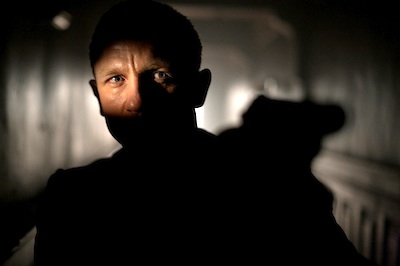
The question arises because the James Bond of Skyfall no longer seems like an exhausted relic from another era, as he often did during the ’90s and early 2000s. Instead, he now feels like a character who has been fully and (for the most part) successfully reinvented as a merciless, sardonic and lethal warrior for our age of terror.
And although Skyfall isn’t quite the classic some critics are making it out to be, it’s easily one of the best Bond films since the 1970s.
On this point, I must confess to having given up on Bond long ago. Until recently 007 was looking like a tired hero — a guy in a middle-age crisis, a character to put in the next Expendables. M needed to send Bond into retirement — maybe ship him off with a fifth of vodka and a Russian mistress (I recommend Anya Amasova, aka Agent XXX from The Spy Who Loved Me) to James Bond Island off the coast of Thailand. Even SPECTRE would probably leave him alone.
After all, with the Cold War long over (despite Vladimir Putin’s best efforts), Great Britain no longer the force it once was, and with women less eager to play characters named ‘Kissy Suzuki’ or ‘Dr. Molly Warmflash,’ you’d think 007 would be quietly boxed away in the attic by now along with vinyl records and your parents’ fondue pot.
Casino Royale in 2006 seemed to change all that, but director Sam Mendes’ Skyfall really confirms it; Bond now absolutely works as a hero for the 21st century. The question is: why?
There are three reasons, in my opinion:
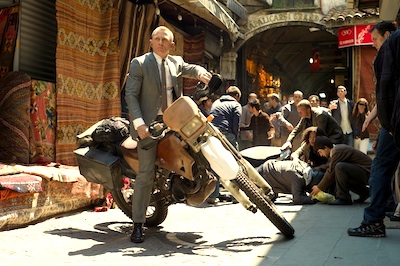
1) Bond has been fully reinvented for the War on Terror era.
This process began in Casino Royale, but Skyfall digs much deeper into the purpose and mentality of our intelligence agencies in the post-9/11 world — and strongly reaffirms their value. Without giving away too much of Skyfall‘s plot, suffice it to say that the entire purpose of the film is to re-invent the James Bond mythology to fit the current war, which as Judi Dench’s M memorably states is fought primarily “in the shadows” — with our enemies less likely to be nation states with massed armies than shadowy, sociopathic operators working within hidden networks.
And it’s precisely in this environment that Bond thrives.
As Skyfall opens, information pertaining to NATO penetration of worldwide Islamic terror cells has been stolen in Istanbul, and Bond has to get the data back before Western agents are exposed and killed. As the story unfolds, Bond’s value as an experienced field agent — able to make human judgments in murky situations and act, where technology alone is inadequate — is constantly reinforced, even when his physical and emotional resources are depleted.
Bond and his colleagues are also depicted as patriotic and reflexively selfless, to the point of being subtly associated with Winston Churchill and his legacy. (Look for references to Churchill’s wartime bunker along with visual cues of a vintage British bulldog.) In the midst of this, the tone of the film is more sober — and befitting of wartime — than what we’ve seen from the Bond series in a long time.
2) Bond movies have finally figured out modern women. More or less.
Let’s face it: no Bond film is going to resemble Steel Magnolias, yet one senses that the Bond series has finally turned the corner in terms of a more modern depiction of women.
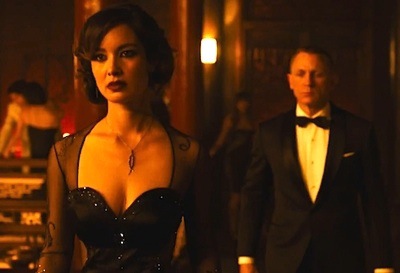
Skyfall does this primarily by way of variety. If you’re looking for the classic Bond femme fatale, Skyfall‘s got that in the alluring Bérénice Marlohe — who looks and acts like she walked right out of Ian Fleming central casting. (Actually, there’s far too little of her in the film.) Or if you’re looking for a modern career girl, able to trade pithy wisecracks with 007, there’s the perky Naomie Harris — who’s obviously primed for a return in the series.
And if you’re looking for gravitas, of course, there’s Judi Dench as M. Skyfall sometimes even feels like it’s her film more than Craig’s. After all, it’s M’s legacy that’s on the line in Skyfall, as dicey decisions made in her past (and present) come back to both haunt and redeem her. And as usual, Dame Judi elevates the proceedings with her intelligence and wit, and her quotation of Alfred, Lord Tennyson’s poem “Ulysses” at a crucial moment in the film — as both she and Britain come under attack — packs an emotional wallop.
3) Bond is still masculine, a man among Hollywood boys.
As for Daniel Craig, one thing is for certain: he’s a hard-ass, easily the first Bond since Connery whom you don’t want to meet in a dark alley. He’s flinty, brutish, more than a little cynical — and withdrawn in the old-fashioned way. He doesn’t do therapy or analysis, and you probably won’t find him on Facebook. He’s refreshingly understated — an adult man with secrets, secrets he isn’t interested in sharing with you.
He also looks good in Tom Ford suits, which helps.
You can’t imagine, for example, Craig playing a superhero in tights — the costume de rigueur for today’s male action stars. That would be too garish, too histrionic for him — because Craig’s Bond doesn’t really view himself as a ‘hero,’ even if others do. He’s simply there to do a job, perform his duty, then walk away. This is an old-fashioned way of looking at the role, more in line with how Bond behaved in the 1950s Fleming novels.
Moving forward, I think it would help Craig if he showed a lighter, more droll side. He needn’t go the full Roger Moore — great as that would be — but maybe just unwind and have a little more fun with the part.
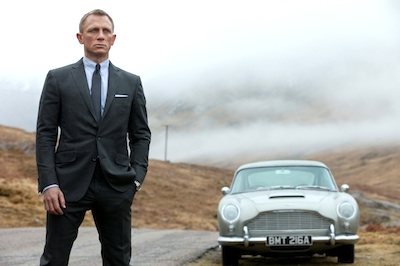
And along these lines, not everything in Skyfall works. Javier Bardem’s role as the villain seems underwritten; Bardem himself is a fine actor, but his villainy here seems to consist mostly in leering at Bond — and having a bad hair dye job. Also: casting Ben Whishaw’s hair as Q doesn’t really work. Maybe there was more of Whishaw in the film — I just didn’t notice.
Plus, I miss Ken Adam’s extravagant sets. Couldn’t Bardem live in a hollowed-out volcano? Or maybe in a levitating palace, surrounded by genetically designed Thai supermodels? That’s still the kind of Bond villain I prefer, because Sam Mendes’ sober, less-is-more approach could make the Bond series very dull, very quickly.
I’ll admit that I wonder what the drily amusing Michael Fassbender might do with Bond (for a taste of that, see him in X-Men: First Class), or a top-flight action director like Michael Bay. I imagine Bay sending Fassbender on a secret mission to Cozumel to investigate fraud in the international lingerie market – only to uncover a massive conspiracy involving talking Aston Martins, or thermonuclear-powered breast implants.
Just throwing around ideas here.
But in the meantime, Bond is definitely back as an action hero for our time – and not a moment too soon.
Posted on November 9th, 2012 at 2:22pm.
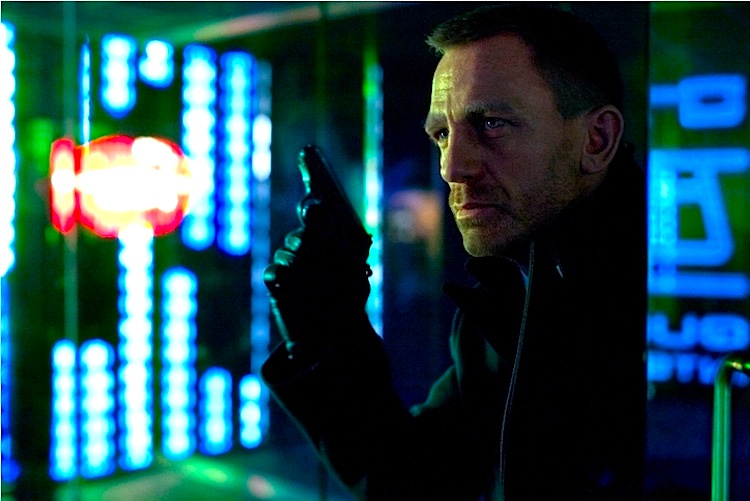
Govindini and Jason, love your work, first time commenter since I am a Bond nut. I’m looking forward to the film a lot more than I was before I read your analysis, as I’ve seen a review that comments on Oedipus complex and Bond family backstory elements, neither of which to me at least are desirable in a Bond film. I would submit, however, that you wouldn’t want to meet Timothy Dalton in a dark alley either – not only was Dalton the finest actor to play the part, he returned it to the gritty realism portrayed in the novels and I find him to be extremely underrated by both casual viewers and reviewers.
Please keep up the very interesting analysis (I particularly enjoy your pieces on older films and libertarian themes).
Cheers
JA